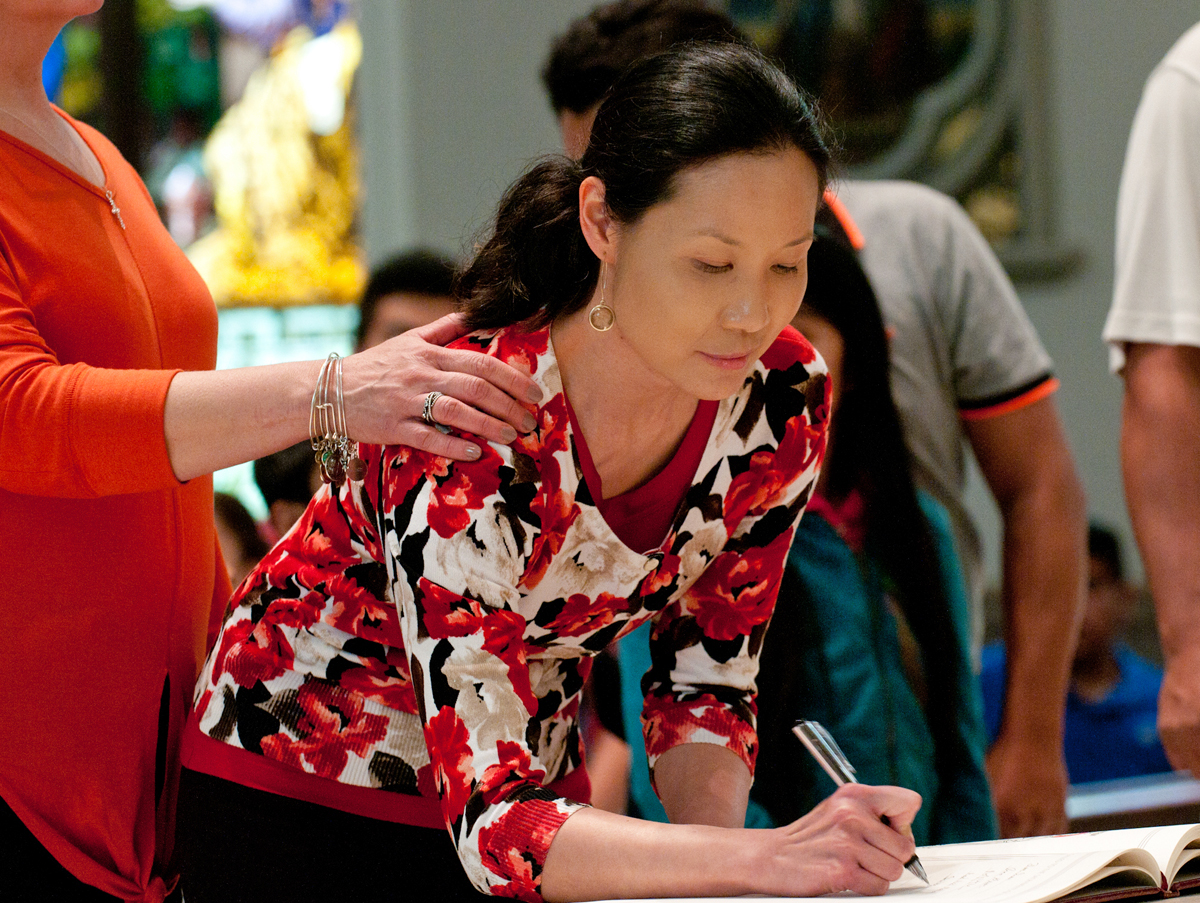
By signing the Book of the Elect and bowing their heads for blessings, hundreds of people continued their conversion at Rite of Election ceremonies held on the first weekend of Lent.
Bishop Robert E. Guglielmone celebrated the rite for the Piedmont deanery Feb. 20 at St. Paul the Apostle Church in Spartanburg; the Midlands deanery Feb. 21 at St. John Neumann Church in Columbia; the Coastal and Pee Dee deaneries at the Cathedral of St. John the Baptist Feb. 22; and the Lowcountry deanery Feb. 23 at St. Peter Church in Beaufort.
The rite is traditionally held around the first Sunday of Lent and is a chance for catechumens and candidates to commit to entering the Church at the Easter Vigil on Holy Saturday.
 At the vigil, catechumens receive the sacraments of baptism, holy Communion and confirmation. Candidates are those who have already been baptized in another Christian denomination, and they come into full communion through being confirmed and receiving the Eucharist.
At the vigil, catechumens receive the sacraments of baptism, holy Communion and confirmation. Candidates are those who have already been baptized in another Christian denomination, and they come into full communion through being confirmed and receiving the Eucharist.
About 500 men and women participated in the ceremonies, according to Michael Martocchio, director of the diocesan Office of Catechesis and Christian Education.
“Lent is a time of prayer and reflection for all of us, but it is especially intense for these people,” Martocchio said. “They are entering into the final stage of their preparation. It’s a life-changing process.”
During the Rite of Election, catechumens come forward with their sponsors to sign the Book of the Elect, which symbolizes their commitment to enter the Church. Candidates typically stand with their sponsors for a prayer and blessing.
During his homily at the Columbia ceremony, Bishop Guglielmone reflected on one of the day’s readings from Genesis, which described the covenant God made with Noah and his descendants after the flood.
He reminded the people that a covenant is a binding, unbreakable promise, and God will never break His covenant even though humans can be sinful and disregard His love.
“No matter what we do, God will continue to love us and offer us all the grace we need to live lives that are f ull and productive,” he said. “We all seek to experience the presence of God, and we have to do our part to respond to His covenant. The reason you’re doing this is because you want to respond to God’s covenant in a deeper way, because you believe there is something more.”
ull and productive,” he said. “We all seek to experience the presence of God, and we have to do our part to respond to His covenant. The reason you’re doing this is because you want to respond to God’s covenant in a deeper way, because you believe there is something more.”
For many people, the Rite of Election is their first chance to publicly acknowledge their desire to become Catholic after following their faith journey.
Trenton Smith, 21, a candidate from St. Joseph Church in Columbia, grew up attending a Methodist church in Murrells Inlet because that was his mother’s denomination. He then went to Baptist churches with his friends when he was in high school.
“I identified as Christian and said I was Baptist because that’s where I went,” he said. “However, I really wasn’t curious about what it meant to belong to any tradition or what it really meant to be Christian.”
Smith, now a junior at the University of South Carolina, said he started asking questions when he entered USC and met his girlfriend, a practicing Catholic. She gave him books about the faith and the two talked frequently about what it meant to be a Christian.
Smith started attending daily Mass and RCIA classes while working as an intern in Washington, D.C., last year, then co ntinued his study when he returned to Columbia.
ntinued his study when he returned to Columbia.
“I came to understand that Catholicism was not just a denomination … it was the Church,” he said. “I realized what I was missing in my world view and opinions on things. I’ve found a lot of peace through learning the truth about the Church.”
Thomas Hartlege, 20, a candidate from St. James Church in Conway, said his parents and many of his friends back home in Kentucky are Catholic, but he had never completed his study of the faith. He started attending RCIA classes while a student at Coastal Carolina University and now can’t wait to be confirmed and receive communion on Holy Saturday.
“This whole process of study has been great,” he said. “It’s been wonderful to share my faith with a great group of people who come from a lot of different experiences. Everything about my faith has a lot more meaning now. I feel like I’m coming home.”

